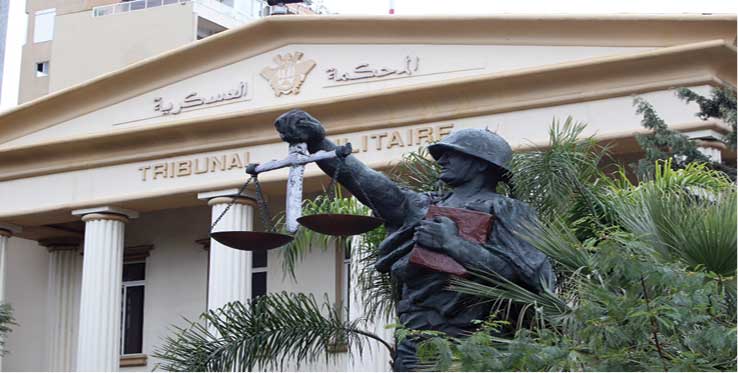
In 2016, we submitted to the UN Mechanisms 21 communications regarding 9 individuals.

LEBANON
 Our Concerns
Our Concerns
- Serious and recurrent violations committed by the security services in the context of counterterrorism, including against Syrian refugees and minors;
- Widespread use of torture, notably to extract confessions;
- Unfair trials before special courts, namely the military court and the Judicial Council;
- Restrictions on the freedom of expression, particularly in response to denunciations of abuses committed by the security services.
 Recommendations
Recommendations
- Put an end to the practice of incommunicado detention and torture perpetrated by the security services and fight impunity by prosecuting perpetrators of such crimes;
- Amend the jurisdiction of the military court and abolish the Judicial Council;
- Ensure that the fight against terrorism is carried out in accordance with international human rights standards;
- Implement the recommendations issued by the Committee against Torture and accepted in the framework of the Universal Periodic Review.
 Upcoming
Upcoming
- April-May 2017: Review of Lebanon by the Committee against Torture;
- Adoption of laws on the promotion and protection of human rights, including the law on the criminalisation of torture.
In 2016, Lebanon remained gripped by political paralysis as the government struggled to adopt new laws and engage in a genuine dialogue process. However, on 31 October 2016, after a deadlock of more than two years, the Lebanese Parliament elected Michel Aoun, a former army chief and founder of the Free Patriotic Movement, as the new Head of State. On 3 November 2016, he entrusted Saad Al Hariri with the role of Prime Minister of Lebanon for the second time, having already held this position previously, from 2009 to 2011. On 28 December, Lebanon’s Parliament went on to approve a national unity cabinet, which includes a State Minister for Human Rights.
As in previous years, Lebanon continued to suffer from the repercussions of the Syrian conflict. With more than one million Syrian refugees on its territory, the country carries the highest per capita concentration of refugees worldwide, despite the strict refugee regulations adopted in 2015. Hezbollah also continued to fight alongside the forces of President Bashar Al Assad in Syria. Moreover, Lebanon’s security situation remained unstable due to threats and clashes between armed groups – affiliated to Al Nusra and the Islamic State – and the Lebanese army, particularly in border areas.
On 19 October 2016, after a year of political impasse, the Lebanese Parliament approved a law establishing an independent National Commission for Human Rights, tasked with enhancing the protection and promotion of human rights throughout the country. As required under the Optional Protocol to the Convention against Torture (OPCAT), which Lebanon ratified in 2008, the Lebanese National Human Rights Institution includes a National Preventive Mechanism; an independent body mandated to visit places of detention. The Commission is yet to be established: if granted the necessary guarantees to carry out its mandate effectively and impartially, this mechanism could be instrumental for victims of abuses to raise violations and obtain redress.

Human rights violations in the framework of counterterrorism
In 2016, a year characterised by instability and insecurity, the Lebanese Armed Forces and Internal Security Forces (ISF) carried out numerous arrests of individuals suspected of terrorist crimes and attacks against the army. Most of these individuals were subsequently held incommunicado and interrogated while being tortured, a practice that remains widespread and systematic in the country despite the recommendations issued by the United Nations Committee against Torture (CAT) in October 2014, following its inquiry in the country. Suspects of terrorist crimes are then referred to the military court – a jurisdiction composed primarily of military judges appointed by the Minister of Defence, to which they are directly subordinated – and subjected to trials violating due process rights. As such, some trials are held in secrecy, without the presence of a lawyer, and are not subject to the control of any independent judicial authority. Furthermore, judges of the military court usually admit confessions extracted under torture into evidence. Moreover, suspects of terrorist crimes may be referred to the Judicial Council, a political body whose members are appointed by the executive and whose decisions cannot be appealed.
This year, Alkarama has documented numerous cases illustrating such violations to the UN human rights mechanisms, including, for example, the case of 25-year-old Syrian refugee, Yarub Al Faraj. In December 2015, he was convicted by the military court for terrorism, on the sole basis of confessions extracted under torture. While being detained incommunicado by the Military Intelligence at Ablah Military Barrack, he was beaten up, sometimes while being suspended from the ceiling, deprived of food and water, and threatened of death.
In addition to often being victims of violations embedded in counterterrorism measures, refugees from Syria were have also been subjected to enforced disappearance, as was the case of Mohamad Al Souki, a 23-year-old Syrian refugee arrested in late August 2016 in Sir El Danniyeh, north of Lebanon, by officers of the Military Intelligence for “not possessing a valid Lebanese residence permit”. He only reappeared a month later, when – upon information received by a former detainee – a notary public went to the premises of the military police at the military court in Beirut and received official confirmation from the authorities that Mr Al Souki was being held there. The UN Working Group on Enforced and Involuntary Disappearances, solicited by Alkarama, subsequently sent a letter to the Lebanese authorities and requested that they shed light on his fate and whereabouts.
In addition, Alkarama is extremely concerned about the fact that minors are not spared from such mistreatment when under suspicion of terrorism. For instance, in September 2014, 16-year-old Walid Diab was arrested while crossing a military checkpoint, on the sole basis of information provided by “secret informants”. During his three-month incommunicado detention, he was kept at the premises of the Military Intelligence in Hanna Ghostine Barracks in Araman, north Lebanon. Here, he was electrocuted, hanged and suspended with his wrists behind his back, beaten, and denied food and water in an effort to extract a forced confession for being a “member of a terrorist group”, charges for which he was prosecuted before the military court. Following Alkarama’s intervention with the relevant UN human rights mechanisms, his case was deferred to a juvenile court, which ordered his release on bail.

Infringements on the right to freedom of expression
Although Lebanon is a country where freedom of expression is generally respected, Alkarama deplores the fact that the authorities have this year resorted to threats and judicial prosecution for “defamation”, a crime that carries prison sentences, to punish and silence those who criticise the authorities or denounce abuses committed by its security services.
The case of Lebanese lawyer Nabil Al Halabi, a vocal critic of corruption and the use of military courts and torture in Lebanon, who was detained by the ISF between 30 May and 1 June 2016, following a complaint filed against him by the Ministry of Interior (MoI) for “libel and slander”, because of a Facebook post he published denouncing corruption of MoI officials, is one such example. During his detention, he was intimidated with the threat of being prosecuted for “having relationships with terrorist groups” such as the Islamic State or Al Nusra Front, because of his previous role in mediating with such groups to secure the release of kidnapped Lebanese soldiers. His release was conditional on the withdrawal of his statements and commitment to never to publish similar declarations.
Denouncing human rights violations in Lebanon can similarly lead to prosecution, as was the case for Layal Al Kayaje, a 31-year-old Palestinian woman who publicly denounced her rape by Military Intelligence officers while she was detained in one of their barracks in Rihaniyyeh in September 2013. On 22 August 2016, the military court sentenced her to one month imprisonment for “defamation and libel against the Lebanese army”.
Similarly, in 2016, the judicial harassment of two human rights defenders, Ms Marie Daunay and Mr Wadih Al Asmar, the President and Secretary General of the Lebanese Centre for Human Rights, respectively, continued. A court case against them was opened in 2011, after the political party Amal filed a complaint against them following the publication of a report denouncing arbitrary arrests and the practice of torture in the country, including by Amal movement members. After a long investigation phase, on 24 February 2014, the investigative judge at the Baadba Court charged them with “defamation” and referred their case to the Court of Publication. Their trial is still ongoing.

LEBANON SHOWS LIMITED WILLINGNESS TO IMPROVE HUMAN RIGHTS SITUATION DURING UNIVERSAL PERIODIC REVIEW
Following the country’s Universal Periodic Review (UPR) before the Human Rights Council (HRC) in November 2015, Lebanon presented its views on the recommendations received to the HRC in March 2016. In doing so, it accepted 130 of recommendations, while only “noting” 89.
In this regard, Alkarama welcomed the acceptance by Lebanon of 15 recommendations regarding the eradication of torture, amendments to its legislation so as to ensure compliance with the Convention against Torture and its Optional Protocol to which Lebanon is a party, as well as its commitment to make efforts to eradicate torture in the country and to hold perpetrators accountable. Moreover, Lebanon accepted a number of recommendations demanding the establishment of a National Human Rights Institution, which are being implemented, as in October 2016, the Parliament approved a law creating an independent National Commission for Human Rights.
Alkarama expresses concern, however, regarding Lebanon’s refusal to note or accept several recommendations made by UN Member States to end the use of military tribunals to try civilians and to establish a de jure moratorium on the death penalty. As such, Lebanon did not accept a recommendation to “limit the Military Tribunal’s jurisdiction to members of the armed forces and enhance the independence of the judiciary”. Similarly, the authorities merely “noted” the recommendations aimed at abolishing the death penalty or ratifying the Second Optional Protocol to the International Covenant on Civil and Political Rights.